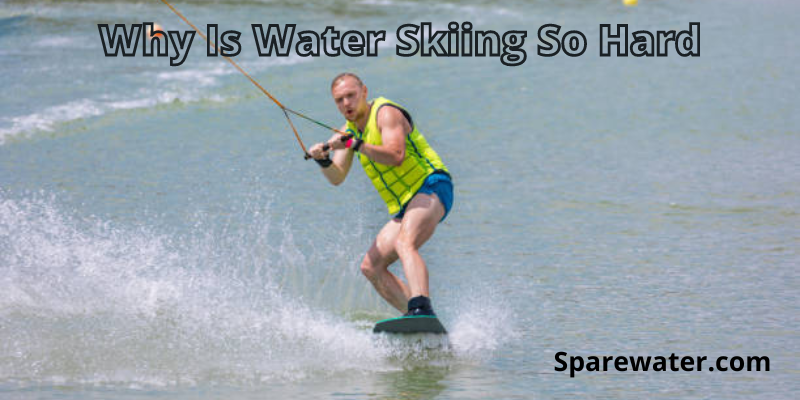Water skiing is a sport that has been around since the 1920s, but it remains one of the most challenging sports to master due to its reliance on strong core muscles and balance.
Water skiers maneuver their bodies in order to stay upright on the water’s surface while being pulled by a boat or other vehicle, often at high speeds.
Why Is Water Skiing So Hard?
There are several reasons why water skiing is so hard to learn, and each of these factors can make the sport more difficult for some people than others.
Body Position
One of the most important elements of water skiing is maintaining your body position during the whole ride.
The skier must be able to keep their body straight from head to toe, with the chest held up high and arms extended out in front for balance.
Additionally, the legs should remain bent at the knees to absorb shock from any waves or bumps in the water surface.
This requires tremendous core strength as well as acute balance that takes some time to develop, making it one of water skiing’s biggest challenges for beginners.
Deep-Water Start
One of the more intimidating aspects of water skiing is getting up onto the skis from a deep-water start.
This involves having to jump off of the boat’s platform and then get into an upright position on the skis without falling or going too far back.
Doing so requires trusting that you have enough strength and balance to stand up quickly enough to not fall back into the water, which can be very difficult for beginners as it takes plenty of practice and coordination.
Turning
Once you have mastered balancing yourself on your skis, learning how to turn properly will be your next challenge.
Turning while water skiing requires precision timing and control, as any slight misstep could throw you off balance.
Furthermore, it takes a great deal of coordination to synchronize your movements with the angle of the boat, which can be intimidating.
Learning how to water ski effectively and safely is an incredibly challenging experience for many beginners due to its reliance on strong core muscles and balance.
Mastering skills such as body position, deep-water start, and turning require plenty of practice in order to master them correctly. Therefore, patience and perseverance are key when learning how to water ski.
With enough time and dedication, anyone can become a successful water skier. With these tips in mind, you will soon be on your way toward mastering this unique sport!
Tips For Improving Water Skiing Skills
There is no magic formula to becoming a great water skier, and taking on this activity can be a challenge. To improve your skills and make water skiing easier, here are some tips:
Practicing On Calm Water
When you’re starting out, it’s a good idea to practice on calm waters so that you can get accustomed to the postures and movements required for skiing.
Don’t expect yourself to be able to ski as well as experienced skiers in choppy waters. Start by learning the basics of skiing in calmer conditions and gradually work your way up to more challenging waters.
Building Strength And Endurance Through Exercise
Water skiing requires physical strength and stamina, especially when attempting tricks or turns with more advanced techniques.
Doing regular cardiovascular exercises such as running or swimming can help build the necessary strength needed for water skiing.
Additionally, core-strengthening exercises like planks or squats can help to build the stability and balance you need while skiing.
Finding A Good Instructor
Having an experienced instructor is essential when it comes to learning how to water ski. A good instructor should be able to provide guidance on technique, offer helpful advice, and ensure your safety.
Look for someone who is qualified in teaching both beginner and advanced water skiers, so that you can learn from an expert as you progress.
Using Appropriate Equipment For Skill Level
If you’re just beginning, it’s important that you use the right equipment for your skill level; this means avoiding any gear or accessories specifically designed for advanced skiers until you have built up your skills sufficiently.
Also, make sure that the amount of weight on the ski rope is matched your abilities; too much pull and you could find yourself going faster than you can handle.
These tips should help improve your water skiing skills, but remember it’s a process that requires patience and practice. Don’t be afraid to take some time out if needed, and always stay safe on the water.
Conclusion
Water skiing is an exciting and challenging sport that requires strength, balance, and coordination.
Learning how to water ski can be difficult for beginners, as mastering skills such as body position, deep-water start, and turning require plenty of patience and practice.
However, with determination and the right equipment, anyone can become a successful skier in no time.
Remember to take it slowly while you’re learning the necessary techniques and enjoy the experience, with enough dedication you’ll soon be enjoying all the thrills that come with being a great water skier.
